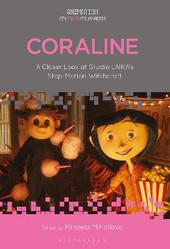
|
Coraline: A Closer Look at Studio LAIKA's Stop-Motion Witchcraft
Hardback
Main Details
| Title |
Coraline: A Closer Look at Studio LAIKA's Stop-Motion Witchcraft
|
| Authors and Contributors |
Edited by Dr. Mihaela Mihailova
|
| Series | Animation: Key Films/Filmmakers |
|---|
| Physical Properties |
| Format:Hardback | | Pages:296 | | Dimensions(mm): Height 229,Width 152 |
|
| Category/Genre | Film theory and criticism
Animated films |
|---|
| ISBN/Barcode |
9781501347863
|
| Classifications | Dewey:791.4372 |
|---|
| Audience | | Tertiary Education (US: College) | |
|---|
| Illustrations |
17 bw illus
|
|
Publishing Details |
| Publisher |
Bloomsbury Publishing Plc
|
| Imprint |
Bloomsbury Academic USA
|
| Publication Date |
23 September 2021 |
| Publication Country |
United States
|
Description
Coraline (Henry Selick, 2009) is stop-motion studio LAIKA's feature-length debut based on the popular children's novel by British author Neil Gaiman. Heralding a revival in global interest in stop-motion animation, the film is both an international cultural phenomenon and a breakthrough moment in the technological evolution of the craft. This open access collection brings together an international group of practitioners and scholars to examine Coraline's place in animation history and culture, dissect its politics, and unpack its role in the technological and aesthetic development of its medium. More broadly, it celebrates stop motion as a unique and enduring artform while embracing its capacity to evolve in response to cultural, political, and technological changes, as well as shifting critical and audience demands. Divided into three sections, this volume's chapters situate Coraline within an interconnected network of historical, industrial, discursive, theoretical, and cultural contexts. They place the film in conversation with the medium's aesthetic and technological history, broader global intellectual and political traditions, and questions of animation reception and spectatorship. In doing so, they invite recognition - and appreciation - of the fact that Coraline occupies many liminal spaces at once. It straddles the boundary between children's entertainment and traditional 'adult' genres, such as horror and thriller. It complicates a seemingly straight(forward) depiction of normative family life with gestures of queer resistance. Finally, it marks a pivotal point in stop-motion animation's digital turn. Following the film's recent tenth anniversary, the time is right to revisit its production history, evaluate its cultural and industry impact, and celebrate its legacy as contemporary stop-motion cinema's gifted child. As the first book-length academic study of this contemporary animation classic, this volume serves as an authoritative introduction and a primary reference on the film for scholars, students, practitioners, and animation fans. The ebook editions of this book are available open access under a CC BY-NC-ND 4.0 licence on bloomsburycollections.com.
Author Biography
Mihaela Mihailova is Assistant Professor in the School of Cinema at San Francisco State University. She has published in Journal of Cinema and Media Studies, [in]Transition,Convergence: The International Journal of Research into New Media Technologies, Feminist Media Studies, animation: an interdisciplinary journal, Studies in Russian and Soviet Cinema, Flow, and Kino Kultura. She has also contributed chapters to Animating Film Theory (with John MacKay), Animated Landscapes: History, Form, and Function, The Animation Studies Reader, and Drawn from Life: Issues and Themes in Animated Documentary Cinema. Dr. Mihailova is the co-editor of Animation Studies and currently serves as Secretary of the Society for Animation Studies
ReviewsCoraline: A Closer Look at Studio LAIKA's Stop-Motion Witchcraft is an exciting collection and a much welcome contribution to animation studies. The essays address Coraline from a range of perspectives, collectively positioning it as a key LAIKA feature and a landmark in stop-motion history. A great read for all animation enthusiasts. * Filipa Antunes, Lecturer in Humanities, University of East Anglia, UK * Henry Seleck's masterpiece Coraline endures as a haunted and haunting exploration of the adolescent trauma of coping with emerging competing identities. It is also vastly entertaining and technically brilliant. Mihailova leads her band of witchery-finders on a quest to expose the alchemy behind the film. They explore the sophisticated stop-motion technology of the LAIKA studio (state-of-the-art, yet harking back to the earliest days of cinema), the labyrinthine passages of meaning and interpretations honeycombed within the narrative, and its myriad cultural references and resonances. Throughout, the book echoes Mihailova's thesis that Coraline succeeds not only as one of the best stop-motion films ever, but also, reflexively, as a rich work that self-challenges its own animated creation. * Donald Crafton, Joseph and Elizabeth Robbie Professor Emeritus of Film, Television, and Theater, University of Notre Dame, USA *
|